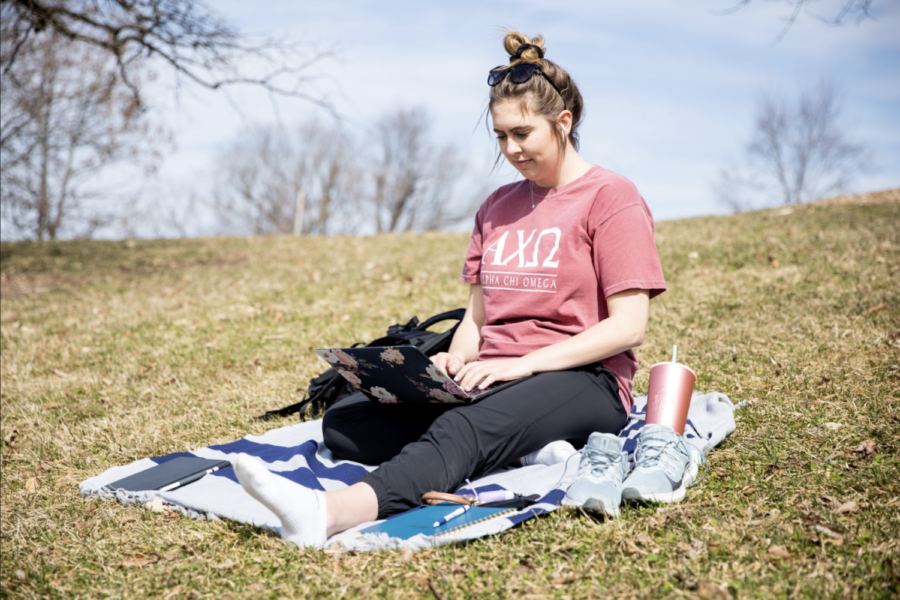Spring broke: Change to calendar leaves students nostalgic
Madeleine Spencer, a freshman environmental science and natural resources major, does homework while enjoying the warm weather on Wednesday, March 10, 2021, outside of William T. Young Library in Lexington, Kentucky. Photo by Jack Weaver | Staff
March 16, 2021
In March of last year, students left for campus for spring break knowing they would have two weeks of online classes after. Some students went home, while others set off for beaches and vacations across the country, sneaking in one last hoorah before COVID-19 lockdowns began.
By the middle of 2020’s spring break, UK had decided to remain online for the rest of the semester and students returned to campus in shifts to move out for good. This year’s spring break looks a bit different: the university replaced the usual week-long break with a one-day academic holiday, creating a three-day weekend at the end of March.
UK decided to remove spring break from the spring 2021 academic calendar in hopes of “creating a safer, more condensed experience for our campus community, during which travel is less likely,” UK President Eli Capilouto said in an email to students on Sept. 17, 2020.
The news sparked a backlash from students, with some tweeting that they would be go on trips anyway, a logistically feasible option due to online classes. Others agreed with the decision saying that it was a necessary sacrifice to overcome the COVID-19 pandemic.
With the one-day academic holiday coming up on March 26, students still have mixed reactions and plans for the three-day weekend.
UK freshman Emily Earnst and Taylor Kennedy said they would both stay on campus for the three-day weekend. Earnst said if she could go anywhere for an actual full spring break right now, it would probably be home to spend some time with her family.
Kennedy said this wasn’t the first time her spring break had been a bit of a bore; her high school senior spring break trip was canceled last year due to COVID-19 as well.
Junior media arts and studies major Ashley McCann said she plans to do the same during the shortened break: just spend an extra day doing the usual. This time last year, McCann was at home with her family waiting on the news of virtual school and move-out instructions from UK. McCann also said that even though she wishes she could be somewhere warm or out in the countryside, she understands UK’s decision to shorten the break.
“I feel like it makes sense that we didn’t have spring break, because everyone would have gone somewhere and we would have had to do so much more testing,” McCann said.
Some universities are offering a financial incentive for students to stay on campus during spring break. UC Davis is giving students $75 for staying on campus in hope of minimizing travel.
Nathan Munster, a senior music education major, said his plans consist of pretty much just staying here in Lexington during the break, though he wishes he could have a traditional beach spring break in Florida before he graduates.
Alexis Cerise, a sophomore music performance major, said she actually does have plans for a short trip to New River Gorge in West Virginia to hike with friends.
“We wanted to do something that allows us to still be away from people,” Cerise said.
Cerise said that she didn’t have any plans last year, but if she could have a pre-COVID full break again this year, she would use it to take a little bit of a bigger trip to Minnesota to find a new instrument.
Matthew Soller, freshman marketing major, and Adam Creeham, a freshman kinesiology major, both said they were taking the extra day off to catch up on homework and school. Soller and Creeham both added that they could definitely both use a full-length spring break right now, even if that just meant some time off school.
Some professors scheduled breaks into their syllabus to give students a mental respite.
Dr. Lauren Cagle, a professor of writing, rhetoric and digital studies, said she saw a need for the break based on what she saw in the fall.
“I knew that by spring midterms, both students and I would be struggling to stay motivated and synthesize new information,” Cagle said. She built in a break both to give her time to grade and time for students to absorb what they’ve learned.
“When I reminded students about our course spring break during a zoom class, they all responded with heart emojis. Students are under so much pressure right now, and experiencing so much strain,” Cagle said, noting that students have faced challenges like becoming caretakers, missing interactions, grieving loved ones and facing illness this year while feeling pressured to act as if everything is normal.
“Giving all of us a break isn’t about generosity. It’s about doing the right thing for all of uss, intellectually and ethically,” Cagle said.
Regardless of their plans, students can keep themselves and their community safe by practicing social distancing and being regularly tested for COVID-19. With finals week just a month out from the three-day weekend, students can see the light at the end of the tunnel and the addition of two reading days during prep week may offset some of their semester fatigue.
































































































































































